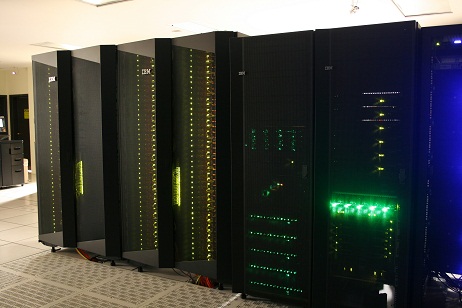Upgrade Triples Computational Capability of Razor Supercomputer

Razor II helps researchers explore the fundamental properties of chemicals and nanomaterials, new methods of detecting breast cancer and many other specialized problems.
FAYETTEVILLE, Ark. – Student and faculty researchers at the University of Arkansas will benefit from a substantial hardware upgrade to Razor, the flagship supercomputer of the Arkansas High Performance Computing Center. The upgrade is funded by a $900,000 grant from the National Science Foundation and significantly increases the computer’s computational capability, said Rick McMullen, who was recently named the center’s new director.
“The Razor cluster is a major asset for U of A researchers,” McMullen said. “This upgrade brings world-class computing power to the university and the state and makes us more competitive as a research intensive institution.”
The upgrade occurred as a result of a multidisciplinary research project to provide better tools for computational science across the University of Arkansas campus. Four researchers – principal investigator Douglas Spearot, associate professor of mechanical engineering, and co-principal investigators Jackson Cothren, associate professor of geosciences; Magda El-Shenawee, professor of electrical engineering; and Peter Pulay, professor of chemistry – submitted the NSF grant proposal.
The original Razor system, which was activated in early 2011, featured 126 dual hex-core processor units with a processing capability of 17.75 teraflops, or one trillion floating point operations per second. The phase II expansion – now called Razor II – added 113 dual oct-core processor units with a capability of 37.67 teraflops. As a whole, the system now boasts a total of 3,320 computer cores and 55.35 trillion floating point calculations per second.
“In other words, we’ve tripled our computational capability,” said Jeff Pummill, manager of cyberinfrastructure enablement for the center. “To give you a sense of how powerful this is, it would take more than 40,000 years for a human to calculate a trillion floating point operations on a manual calculator.”
The Arkansas High Performance Computing Center supports research in computer science, integrated nanoscience, computational chemistry, computational biomagnetics, materials science and spatial science. Faculty and students from a growing number of departments at the university use high performance computing resources to explore the fundamental properties of chemicals and nanomaterials, complex problems in phylogenetics and genomics, new methods of detecting breast cancer, the organization of large sets of spatial data and many other specialized problems.
For example, the computational power of Razor II helped physics professor Salvador Barraza-Lopez on a project designed to understand how pinching a graphene membrane changes its electronic properties. To do this, Barraza-Lopez and his research collaborator wanted to increase the number of atoms in a molecular dynamics simulation by more than one order of magnitude, a task that greatly increased the computational demand for the problem.
“This was possible only because I had direct access to 1,600 processors,” Barraza-Lopez said. “The textures needed were generated by Razor II in less than one day, a task that would have taken about ten days of continuous computing at a normal, shared-resources facility.”
Although scientific computing is indispensible in disciplines such as chemistry, physics and engineering, researchers in other disciplines are turning to high performance computing to meet their analysis and simulation needs, as well, McMullen said.
“We are seeing more non-traditional users from fields such as geography, biological and agricultural engineering and business take advantage of computing resources and expertise offered by the center,” McMullen said. “We expect to see greater use by biologists, sociologists and medical researchers as well.”
The Arkansas High Performance Computing Center is funded by grants from the National Science Foundation and the Arkansas Science and Technology Authority. The center’s resources may be used by any faculty member or student at the University of Arkansas or other Arkansas universities that are members of the Arkansas Research and Educational Optical Network, or ARE-ON.
McMullen, the former director of research computing at the University of Kansas, has served as director of the Arkansas High Performance Computing Center since Aug. 13. As a scientist and technology strategist, McMullen has spent more than 20 years in high performance computing research and technical management. His positions have included work on strategic technology evaluation and planning in both the private sector and higher education. He has focused his career on developing and applying novel information and communication technologies to solve problems in computationally intensive and data-intensive research. In addition to serving as director of the Arkansas High Performance Computing Center, McMullen is a faculty member in the College of Engineering’s department of computer science and computer engineering.
Topics
Contacts
Rick McMullen, director
Arkansas High Performance Computing Center
479-575-8681,
dfmcmull@uark.edu
Matt McGowan, science and research communications officer
University Relations
479-575-4246,
dmcgowa@uark.edu
Headlines
U of A's Inspirational Chorale Makes Its Carnegie Hall Debut
The U of A's Inspirational Chorale took center stage at Carnegie Hall in March, performing under the direction of professor Jeffrey Murdock to a packed audience at the iconic Stern Auditorium.
The State of Economics With Mervin Jebaraj Set for June 5
U of A economist Mervin Jebaraj will analyze state's economic trends and regional issues in an upcoming talk. Preregistration is required by May 31.
Faculty Demonstrate Dedication to Student Success Through Teaching Credentials
Eight faculty members from across the U of A have earned the prestigious Association of College and University Educators certification in Effective College Teaching.
Artificial Intelligence, Machine Learning Boost Arkansas Animal Science Research
Aranyak Goswami, a bioinformatics specialist, will work with three different departments to boost the research arm of the U of A System Division of Agriculture.
College of Education and Health Professions Doctoral Student Picked for Grosvenor Fellowship
Jessica Culver, a doctoral student in the College of Education and Health Professions Adult and Lifelong Learning program, has been selected as a member of the 2024 Grosvenor Teacher Fellowship.




